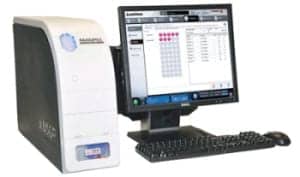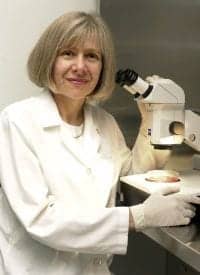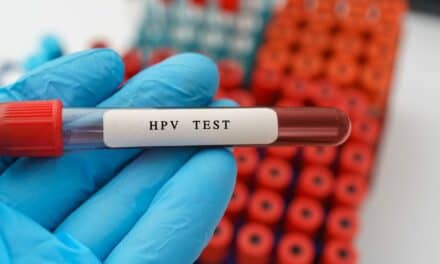
Luminex Wins Medical Design Excellence Award

Luminex Corp, Austin, Tex, has won a 2011 Medical Design Excellence Award in the category of In Vitro Diagnostics for its innovative MAGPIX system. Introduced in 2010, MAGPIX is a compact, versatile laboratory analysis platform designed to improve productivity by delivering multiple highly accurate, reproducible results from a single sample.
MAGPIX can quickly detect and measure both proteins and nucleic acids (DNA and RNA) in a variety of sample types. It simultaneously performs up to 50 tests per sample, significantly reducing the amount of sample, consumables, and labor required over competing systems. Capable of producing up to 4,800 data points in approximately 1 hour, it was designed for use by laboratory scientists conducting disease-related research, pharmaceutical R&D, and clinical laboratories.
“MAGPIX is an innovative and strategically important addition to our portfolio that will make science and medicine faster and more cost-effective for researchers and certain clinical labs,” said Patrick J. Balthrop, president and CEO of Luminex Corp. “It is an honor to be recognized by MDEA for our efforts to bring technology to market that is aimed at improving the health of people around the world.”
The 2011 Medical Design Excellence Award winners will be honored at a presentation ceremony on Wednesday, June 8, in New York’s Jacob K. Javits Convention Center. The award gala is being held in conjunction with the Medical Design & Manufacturing East Conference and Exposition (www.MDMEast.com), June 7 to 9. Gold and silver award recipients will be announced at this time.
Thermo Spectrometer Named Scientists’ Choice Winner

Thermo Fisher Scientific, Madison, Wis, announced that its Thermo Scientific Nicolet iS5 FT-IR spectrometer received a 2011 Scientists’ Choice Award for Best New Spectroscopy Product of 2010. The award, voted on by scientists, recognizes the no-compromise, affordable, and compact FT-IR spectroscopy capabilities of the rugged instrument.
The Nicolet iS5 combines flexible sample handling with Thermo Scientific OMNIC software to deliver the ideal FT-IR solution for manufacturers, forensic laboratories, and chemistry classrooms. The instrument, which provides performance comparable to larger-sized spectrometers, is used for product assurance testing, basic troubleshooting, and chemistry teaching.
This year, more than 35,000 members of the SelectScience.net web community were invited to nominate their favorite general lab, separations, and spectroscopy products. The most popular nominated products were then voted on by scientists. The Thermo Scientific Nicolet iS5 received approximately one quarter of the votes and was selected as winner from among eight final nominations. The award ceremony took place at Pittcon 2011 in Atlanta.
“It is a great honor for our Nicolet iS5 to be nominated by its users, and I congratulate the FT-IR and IR microscopy teams in Madison, Wisconsin, for delivering such a reliable, robust, and high-performance spectrometer,” said Brian Davies, vice president and general manager of molecular spectroscopy and microanalysis, Thermo Fisher Scientific. “The spectrometer’s reasonable price, compact size, and superior ease of use make this technology more accessible, even to non FT-IR specialists.”
Neuralstem Presents Interim ALS Trial Results

Neuralstem Inc, Rockville, Md, has announced that Eva Feldman, MD, PhD, principal investigator of the Phase I safety trial of Neuralstem’s human spinal cord stem cells (HSSC) in amyotrophic lateral sclerosis (ALS or Lou Gehrig’s disease), and unpaid Neuralstem consultant, presented interim safety data on the first nine patients.
Feldman reported April 11 at the American Academy of Neurology (AAN American Academy of Neurology (AAN) Annual Meeting that all nine ALS patients remain alive and that there were no unresolved serious adverse reactions related to surgery. Of the three ambulatory patients who were treated, all remain ambulatory with no serious adverse events secondary to surgery.
“We are delighted,” Feldman said. “This data demonstrates it is feasible to transplant stem cells directly into the spinal cord of patients with ALS using the procedure and device we developed for this trial.” Feldman is also director of the A. Alfred Taubman Medical Research Institute and director of research of the ALS Clinic at the University of Michigan Health System. “This groundbreaking work has never been done before, and we are thrilled that it can be done safely,” she added.”
In the group of nine male patients, ranging in age from 37 to 66 years, with ALS duration at the time of surgery ranging from 1 to 12 years, the first six were nonambulatory with complete paralysis. Of these, four out of six experienced transient neuropathic pain in the spinal dermatomes near the injected area within 24 hours of the procedure, which resolved with no treatment. Three out of the six experienced adverse events secondary to immunosuppression, which were resolved via dose adjustment in two cases and discontinuance in the third. One patient experienced a pulmonary embolism 19 days postsurgery secondary to an iliac vein thrombosis, unlikely related to the cells. All adverse events were resolved. In the group of ambulatory patients, all three remain ambulatory and experienced no serious adverse events secondary to surgery.
This Phase I safety trial is designed to enroll up to 18 patients. If approved by the FDA and the trial’s safety monitoring board, the trial will progress to cervical transplantation in the summer of 2011.
Amgen Cancer Drug Fails in Phase 3 Study
Amgen, Thousand Oaks, Calif, has announced the top-line results from the pivotal Phase 3 trial evaluating motesanib administered in combination with paclitaxel and carboplatin in 1,090 patients with advanced non-squamous non-small cell lung cancer (NSCLC). The trial did not meet its primary objective of demonstrating an improvement in overall survival.
“We are disappointed with the results from this trial, but look forward to further analysis of the data which may ultimately help inform future research in this area,” said Roger M. Perlmutter, MD, PhD, executive vice president of research and development at Amgen.
Overall, the adverse event profile for motesanib was consistent with that seen in previous motesanib studies in NSCLC. Notable adverse events reported included hypertension, GI events (abdominal pain, diarrhea, nausea, and vomiting), gallbladder events (cholecystitis, gallbladder enlargement), fatigue, and hematological events (neutropenia, thrombocytopenia). Serious adverse events were more frequently reported in the motesanib arm.
Detailed results will be submitted for presentation at an upcoming medical congress.
Dilon Diagnostics Hailed as Top Innovator

The US Department of Energy (DoE) has acclaimed Dilon Diagnostics, Newport News, Va, as a success story in the field of medical technology and innovation for commercializing the technologies of the national laboratories. According to the government agency, Dilon and similar entrepreneurs “build the new industries of the 21st century, and help solve some of our toughest global challenges.”
The Dilon 6800 digital gamma camera is based on gamma-imaging technology developed at the DoE’s Thomas Jefferson National Accelerator Facility in Newport News, Va. The medical procedure that this advanced imaging technology enables is known as Breast-Specific Gamma Imaging/Molecular Breast Imaging (BSGI/MBI), and reveals cancerous lesions even at very early stages. BSGI/MBI is a proven technology that can find cancers missed by mammography and ultrasound.
“We are honored to be acknowledged by the Department of Energy as one the country’s successful innovators in the medical technology field,” said Bob Moussa, president and CEO of Dilon. “We have been able to make a significant impact by utilizing our licensing agreement with Jefferson Lab to help save lives.”
Consortium Formed to Develop Immunoassay Detection Device

The P3SENS Consortium, Mons, Belgium, has been formed to develop an immunoassay detection device suitable for use in emergency medicine, whether diagnosis is required in an ambulance, emergency department, or as part of a rapid near-patient laboratory test in a hospital environment. The requirement for such a technology to be stand-alone, without the infrastructure associated with a laboratory, dictates that a number of key processes are completed automatically within the system. The ability of a biosensor platform to manipulate liquid samples and deliver any biomarkers which may be present to the surface of the sensor in a manner which ensures accurate and reliable detection is critical.
In the P3SENS project the aim is to design, develop, and realize robust microfluidic systems which are applicable for fast and cost-effective sample transport and still contain some simple sample-preparation functions, such as mixing or dilution. Preliminary microfluidic structures have been designed taking into consideration the proposed layout of the sensor chip and the material requirements. The microfluidics are to contain six parallel individually addressable channels with the integrated functions of washing and mixing by applying different mixer components.
The key issue of the integrability and final applicability of the developed structure is an appropriate polymer material selection, which will have a critical impact on the requirement for leakage-free bonding. The polymer materials which are most suitable for realizing simple microfluidic systems have been identified as Polydimethylsiloxane (PDMS) and the epoxy-based negative photoresist SU-8. These materials are relatively low-cost and can be easily structured by the combination of microlithography and polymer technology. The fabrication process has been established for both PDMS and SU-8 polymer materials, and test structures are currently being validated.
MIT to Use Roche System to Advance Cancer Research

Indianapolis-based Roche has announced that the David H. Koch Institute for Integrative Cancer Research at MIT will be using the Roche LightCycler 480 system, a real-time polymerase chain reaction (PCR) system for the analysis of gene expression and genetic variation, in advanced cancer research.
The Koch Institute plans to use the LightCycler 480 System to support several key areas of research it has identified as being critical for rapid progress toward controlling cancer, such as exploring the molecular and cellular basis of metastasis and engineering the immune system to fight cancer. The Institute is affiliated with the Massachusetts Institute of Technology in Cambridge.
“Our approach at MIT offers a unique collaboration between scientists and engineers, which has helped place us at the forefront of the fight against cancer,” said Robert Urban, executive director of the Koch Institute. “The LightCycler instruments will provide the platform to help us take advantage of the many applications for real-time PCR technology in cancer research.”
Leica Licenses Digital Pathology Patents from Olympus

Leica Microsystems, Wetzlar, Germany, and Olympus America, Center Valley, Pa, have signed a nonexclusive worldwide licensing agreement allowing Leica to access an extensive portfolio of patents held by Olympus in the field of digital pathology and virtual microscopy. The patents included in the licensing deal cover methods and equipment for creating, storing, and delivering virtual microscopy slides. The technology enables individuals to view and share high-resolution virtual microscopy images over the Internet.
“We believe digital slide scanning will be the fastest-growing segment in microscopy for years to come. This license agreement will enable us to further expand our offering in this space, and to provide our customers around the world with a complete solution from digital scanning of microscopy slides to the handling and management of digital pathology data,” said Stefan Traeger, managing director of Leica’s Life Science Division.

To keep up to speed on Industry News, bookmark www.clpmag.com
“We’ve seen interest in digital slide scanning grow rapidly over the past few years,” said Osamu Joji, group vice president and general manager of Olympus America’s Scientific Equipment Group. “Olympus is the holder of these important patents, and we feel it is vital to allow broad access to these technologies in order to advance the field of pathology. Ultimately, we hope that implementing these technologies will help enhance health care for patients around the world.”
The companies are not making specific terms and conditions of the agreement public.




